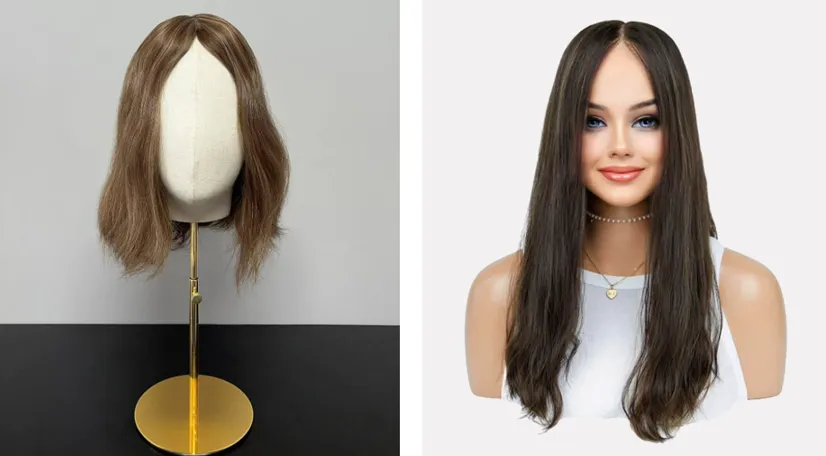What makes a wig kosher?
Cultural and religious observances often intersect with hair choices. But what defines a kosher wig?
A kosher wig adheres to specific standards of Jewish Law, often encompassing ethical sourcing, cleanliness, and suitability for covering hair during religious practices.
Understanding these requirements can guide consumers in making choices that align with their beliefs.
Are kosher wigs made in China?
Sourcing impacts perceptions of quality and affordability. What role does China play in wig manufacturing?
Yes, many wigs are made in China, where a significant portion of the global wig industry is based, offering diverse options ranging from synthetic to human hair.FD Jewish wigs in one of the best jewish wigs factory in Qingdao, China.
Examining Sourcing Dynamics
Chinese wig manufacturing dominates due to its expansive scale and capacity for variety. The industry leverages access to both synthetic and human hair vaults, enabling diverse production. Its infrastructure supports efficiency, keeping prices accessible while still meeting international standards. Ethical considerations are increasingly addressed, with factories integrating sustainable practices. Brands often assure quality control through partnerships and audits, enhancing credibility. Whether securing luxury or budget-friendly choices, China remains an influential hub in wig availability and choice.
Are Milano wigs kosher?
Milano represents quality and style but does it comply with kosher standards?
Milano wigs are known for being kosher, as they are crafted with adherence to Jewish Laws concerning ethical sourcing and wearing during religious activities.
Kosher Quality and Assurance
Milano takes pride in ensuring their wigs meet the criteria deemed necessary by religious authorities. This includes careful selection of hair sourced from permissible origins and verification processes ensuring ethical standards. The designs focus on providing natural coverage fulfillment in line with traditional requirements. With a commitment to quality, Milano not only delivers fashionable, luxurious wigs but also caters to markets that respect and observe religious dictates, establishing consumer trust in kosher credibility.
Does the Bible forbid wigs?
Religious texts guide believers’ practices, including grooming choices. What does the Bible say about wigs?
The Bible does not explicitly forbid wigs. However, interpretations vary, and individuals may choose wig use based on personal or community norms rather than textual prohibitions.
Contextual Understanding
Biblical scriptures lack direct mentions regarding wigs or hair extensions, leaving room for personal interpretation. Decisions often reflect community traditions or rabbinical insights stressing modesty and authenticity. While wigs generally align with cultural acceptance, guidelines might influence specific choices in styles or materials. Ultimately, individual or community perspectives direct wig adoption practices, respecting broader religious context over explicit biblical injunctions. Personal reflection ensures congruence between style decisions and spiritual observance.
Why are Milano wigs so expensive?
High pricing often correlates with premium attributes. What contributes to Milano’s cost?
Milano wigs are expensive due to their use of high-quality materials, skilled craftsmanship, ethical sourcing, and innovative construction, which ensures a natural look and longevity.
Evaluating Cost Factors
Milano’s high price is justified by the quality assurances embedded in each piece. Premium human hair, meticulously sourced and processed, forms the foundation for their elegance. Their design focuses heavily on comfort, utilizing advanced cap constructions for secure, breathable wear. Additionally, maintaining kosher standards involves extra measures, enhancing ethical transparency in production stages. Skilled artisans ensure detailed craftsmanship that emulates natural hair movement, contributing to their high reputation and associated cost, offering lasting style and value.
Are Milano wigs real hair?
The authenticity of materials significantly affects appearance and usability. How genuine are Milano’s offerings?
Milano wigs are primarily made from real human hair, providing a natural look, style versatility, and comfort for daily or occasion wear.
Authentic Material Attributes
Milano’s commitment to excellence shines through their use of real human hair wigs. Human hair ensures wearers can wash, style, and treat their wigs akin to natural hair, accommodating flexibility in personalization. Their wigs exude realism, with aligned cuticles maintaining longevity and reducing tangling risks. Milano’s sourcing focuses on ethical practices, reinforcing their prestige as a provider of high-caliber wigs. By selecting genuine materials, they assure lifelike wigs, balancing elegance with reliability.
What brands are kosher?
Market demand for kosher wigs calls for awareness of brands upholding religious standards. Who leads this sphere?
Brands like Milano and FD Jewish Wigs are renowned for offering kosher wigs that meet religious requirements, ensuring ethical and reliable choices for observant individuals.
Milano and Freeda uphold kosher credibility through dedication to ethical sourcing, rigorous quality checks, and rabbinical endorsements. Their wigs and tape in hair extensions integrate religious acceptability, featuring designs suited for traditional coverage values. Customers benefit from their products’ reliability, adaptability, and purity. By adhering to spiritual imperatives, they foster loyalty in communities valuing adherence. The inclusion of kosher options reflects growing sensitivity to distinct cultural needs, ensuring their position as trusted leaders amidst diverse perspectives.
Contemporary wig production refrains from using animal hair, favoring resources like human hair or synthetic substitutes for their desirable styling and comfort qualities. The unaligned texture and ethical concerns associated with animal hair have discouraged its widespread use in the market. Industry shifts prioritize sustainable, safe sources, accommodating diverse preferences without compromising integrity. Understanding these preferences aids in focusing choices on materials that align with modern fashion and consumer ethics, ensuring quality and appropriate standards resonate with buyers.



